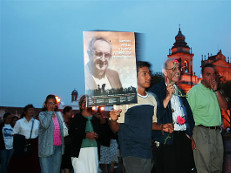This week, we are examining the video lectured provided by Professor Beasley-Murray for Week 4, entitled “Independence Narratives, Past and Present”. To begin, one thing that I found of particular interest to me was the fact that, as mentioned early on, modern times were considered to have begun, or at least in European terms, with […]
Posted in Blogs | Tagged with Equality, Freedom, human rights, independence, indigenous, Power and Wealth, revolution, US Involvement
As we get closer to the modern day in our learning on the politics of Latin America, it seems the issues seemingly become more complex. Perhaps it is the lack of temporal distance; these events are discussions are not clarified by historical distance. Also, as the polarizing and binarizing tendencies of cold war ‘camps’ dissolve, so our compartmentalizing of stakeholders becomes unstructured. Perhaps this dissolution leaves bare these political events, which can no longer be reduced to capitalist versus communist. As these structures lift, we can only wonder how much…read more
Posted in Blogs, Week 12 | Tagged with analytical framework, binary, depoliticization, depoliticizing, human rights, humanism, humanitarianism, Ideology, journalism, madres, polarization, violence
As we get closer to the modern day in our learning on the politics of Latin America, it seems the issues seemingly become more complex. Perhaps it is the lack of temporal distance; these events are discussions are not clarified by historical distance. Also, as the polarizing and binarizing tendencies of cold war ‘camps’ dissolve, so our compartmentalizing of stakeholders becomes unstructured. Perhaps this dissolution leaves bare these political events, which can no longer be reduced to capitalist versus communist. As these structures lift, we can only wonder how much…read more
Posted in Blogs, Week 12 | Tagged with analytical framework, binary, depoliticization, depoliticizing, human rights, humanism, humanitarianism, Ideology, journalism, madres, polarization, violence
A new world order emerges from the atrocities of World War Two. One dominated by nation states, with inviolable sovereignty (ideas of “humanitarian intervention” will wait until the 90s, with the end of the Cold War), and decorated with a humanist ambition embodied by the Universal Declaration of Human Rights, adopted by the newly established United Nations in 1948. Latin Americans would, however, not feel the protection of this declaration. Nation-states would wage violence against the people in their territories, untouchable in terms of the legalized legitimation of state violence….read more
Posted in Blogs, Week 11 | Tagged with flourishing, human rights, humanism, latinx, lives, matter, military, military authoritarianism, Nation state, perseverance, Proxy War, racism, sovereignty, survival, violence, weapons, WWII
Human Rights have been hailed as humanity’s last-standing hope (Samuel Moyn, The Last Utopia, 2010). They are ambitious in potential and broad in scope. Yet, as has been iterated by Prof. Beaseley-Murray in this week’s lecture, the remain “far from ‘self-evident.’” This is because rights are a discourse, not an absolute (expressed by Ronald Dwarkin: “rights as trumps”). Instead, rights must be understood as needing weighing, not hierarchizing (Pildes, The Structural Conception of Rights and Judicial Balancing, 2002). As such rights discourse holds no inherent morality, instead morality must be…read more
Posted in Blogs, Week 6 | Tagged with attributing rights, balancing rights, constitutionalism, discourse, human rights, judicial balancing, justice, law, liberalism, rights, scope of rights, social justice

